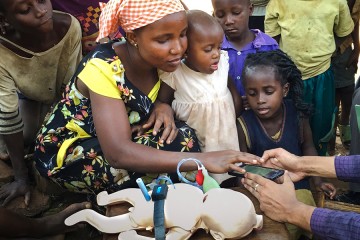Around one table sat a physicist, an anthropologist, a public health expert, and an epidemiologist—all Johns Hopkins faculty but meeting one another for the first time. By the end of their conversation, on issues of global health, several email addresses and business cards were exchanged.
This type of mixing, of scholars and leaders from all corners of Johns Hopkins University, was exactly the intent of the "Cocktails and New Perspectives" event Thursday night sponsored by the Alliance for a Healthier World.
The alliance, launched last summer, stresses collaboration across disciplines in tackling pressing global health challenges in low-resource communities. Thursday's event came on the heels of the awarding of grants to eight interdisciplinary projects working in 11 different countries; proposals for a second cycle of grants are due by Nov. 15.
The signature health initiative is interested in "different ways of doing business," alliance director David Peters said, emphasizing the goal to incorporate "voices from every single campus and division at Hopkins."
The event took place within the soaring atrium of the George Peabody Library, with dozens of Hopkins faculty and staff members rotating among small tables for three rounds of conversations, punctuated by musical interludes from The Witches, a Peabody Institute duo.
At one table, a School of Public Health professor shared details with a bioethicist about a project idea to reduce violence against women collecting wood in West Africa. At another, the conversation focused on health problems in Baltimore.
"This is how intellectual innovation can happen," said Denis Wirtz, JHU's vice provost for research. The hope, he added, is that "marrying these different perspectives can lead to better research, better science."
In addition to networking socials like this one, the Alliance for a Healthier World intends to offer various seminars, workshops, and lectures to bring people together, said Thomas Quinn, a JHU School of Medicine professor who sits on the alliance's steering committee.
In its second cycle of planning grants, the alliance intends to distribute up to $25,000 each to another eight to 10 projects, Peters said. In the spring, larger "implementation grants" will be available to put four proposals into action on the ground, with $250,000 available for each.
The alliance website offers additional details on its funding opportunities and plans for other upcoming events.
Posted in Health, Politics+Society
Tagged global health, interdisciplinary research, alliance for a healthier world










